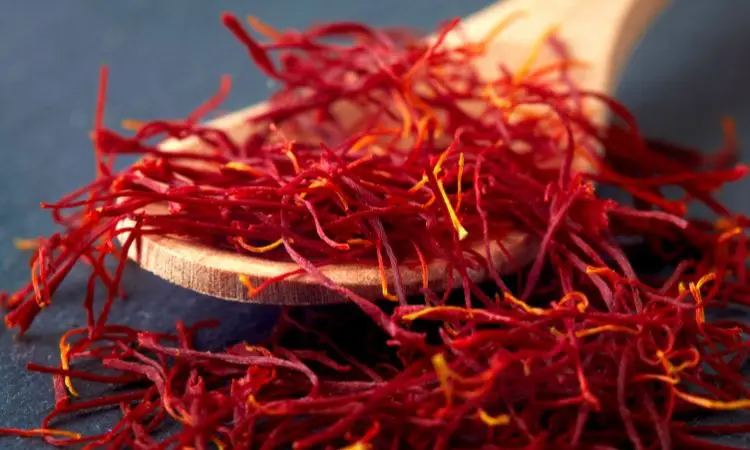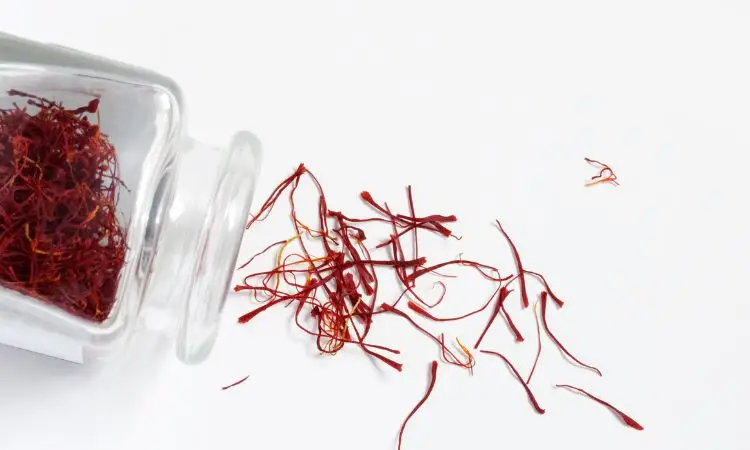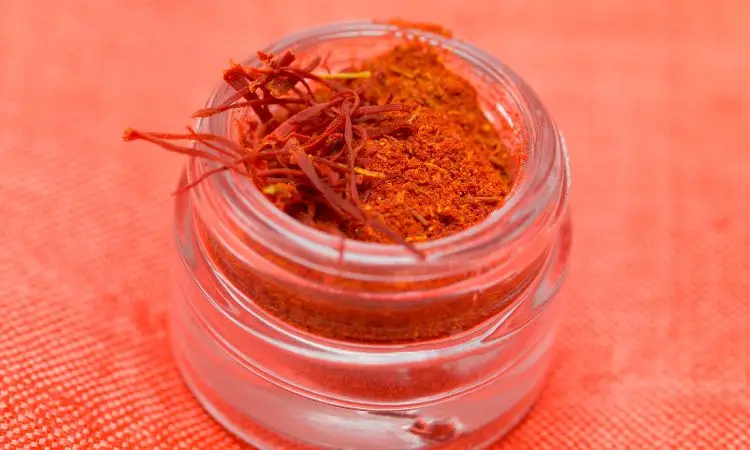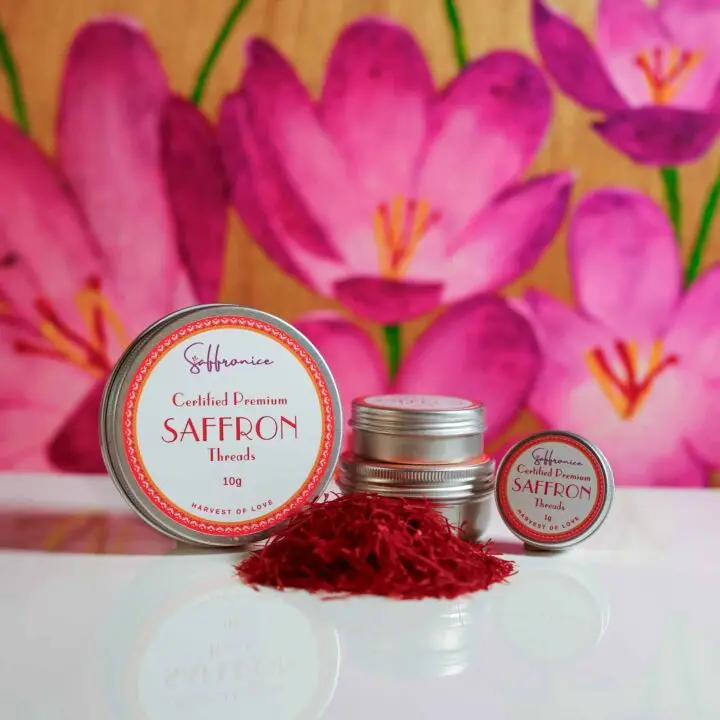Saffron’s rich heritage and traditional uses have laid the foundation for modern scientific exploration, validating its potential as a natural wellness ally. Discover how this versatile spice can support your overall well-being, from mood enhancement and weight management to cognitive function and sexual health.
🔑 Key Takeaways on Mediterranean Saffron Health:
- Saffron is a potent antioxidant with proven anti-inflammatory properties
- Mediterranean saffron has thousands of years of traditional medicinal applications
- Supports mood regulation, weight management, and cognitive function naturally
- May enhance sexual health and hormonal balance
- Provides comprehensive wellness benefits when incorporated into daily diet

Understanding Mediterranean Saffron’s Rich Heritage
Saffron, the vibrant crimson spice, has a captivating history that dates back thousands of years. Originating in the heart of the Mediterranean region, this precious commodity has long been revered for its remarkable health benefits and cultural significance.
Ancient Origins and Cultural Significance
The cultivation of saffron can be traced back to ancient Persia and Greece, where it was prized for its aromatic and medicinal properties. Over the centuries, the spice’s influence has extended across the Mediterranean, with each region developing unique traditions and methods of saffron production. From the sun-drenched fields of Spain to the terraced orchards of Italy, Mediterranean saffron has become an integral part of local heritage and identity.
Chef’s Professional Tip: The Mediterranean climate provides ideal conditions for saffron cultivation—hot, dry summers and cold winters create the perfect environment for Crocus sativus flowers to thrive. This unique terroir contributes to the superior quality and potency of Mediterranean saffron.
Traditional Medicinal Applications
In traditional Mediterranean medicine, saffron was widely used to treat a variety of ailments:
- Respiratory issues and bronchial conditions
- Digestive problems and stomach ailments
- Mood disorders and melancholy
- Aphrodisiac properties for enhancing vitality
- Anti-inflammatory applications for pain relief
The spice’s therapeutic properties were recognized by traditional healers across cultures, who incorporated it into their holistic approaches to wellness. Ancient physicians prescribed saffron for everything from heart conditions to eye disorders, demonstrating the breadth of its perceived medicinal value.
Modern Scientific Validation
As modern science has advanced, the health benefits of saffron have been extensively researched and validated. Numerous studies have confirmed saffron’s potent antioxidant properties, its ability to support cognitive function, and its potential to alleviate various health conditions, from depression to metabolic disorders. This increased scientific understanding has led to a renewed appreciation for the ancient spice and its role in promoting overall well-being.
Food Scientist’s Note: Modern analytical techniques have identified over 150 volatile and non-volatile compounds in saffron, including crocin, crocetin, safranal, and picrocrocin. These bioactive compounds work synergistically to produce saffron’s remarkable health effects.
The Science Behind Saffron’s Powerful Antioxidants
Saffron, the precious spice from the Mediterranean region, is renowned for its impressive antioxidant profile. The vibrant red stigmas of the Crocus sativus flower contain a unique blend of compounds that work together to neutralize harmful free radicals and promote overall well-being.
The two primary antioxidant compounds found in saffron are crocin and safranal. Crocin, a carotenoid pigment, is responsible for saffron’s distinctive hue and has been extensively studied for its potent free radical scavenging abilities. Safranal, on the other hand, is the aromatic compound that contributes to saffron’s signature fragrance and also possesses strong antioxidant properties.
These powerful antioxidants work in synergy to combat oxidative stress, which is widely recognized as a leading contributor to cellular damage, inflammation, and the development of various chronic diseases. By neutralizing free radicals and supporting the body’s natural defense systems, saffron’s antioxidants play a crucial role in promoting longevity and protecting overall health.
| Antioxidant Compound | Key Benefits |
|---|---|
| Crocin | Potent free radical scavenging, anti-inflammatory, neuroprotective effects |
| Crocetin | Enhanced bioavailability, cardiovascular protection, vision support |
| Safranal | Antioxidant activity, anti-depressant properties, cognitive enhancement |
| Picrocrocin | Bitter compound with antioxidant and anti-cancer potential |
The Mediterranean region, where saffron has been cultivated for centuries, has long recognized the spice’s remarkable health-promoting properties. Modern scientific research has further validated the therapeutic potential of saffron and its role in supporting comprehensive health and wellness.
Mediterranean Saffron Health: Nutritional Profile and Guidelines
The golden threads of Mediterranean saffron offer a wealth of health benefits, making it a true superfood. Understanding the key nutritional components, recommended daily intake, and safety considerations can help unlock the full potential of this versatile spice.
Key Nutritional Components
Saffron is a rich source of essential vitamins and minerals, including:
- Vitamin C – Supports immune function and skin health
- Vitamin B6 – Crucial for energy metabolism and red blood cell production
- Manganese – Essential for bone health and metabolism
- Iron – Important for oxygen transport and energy production
- Copper – Aids in red blood cell formation and nerve function maintenance
- Selenium – Powerful antioxidant that protects cells from oxidative stress
Additionally, saffron contains bioactive compounds like crocin, picrocrocin, and safranal, which are responsible for its vibrant color, distinct aroma, and numerous health-promoting properties.
Recommended Daily Intake
For maximum health benefits, experts suggest a daily intake of 30-50 milligrams of high-quality Mediterranean saffron. It’s important to note that saffron is a potent spice, and excessive consumption may lead to side effects, so it’s crucial to follow dosage guidelines.
Food Scientist’s Note: Saffron’s bioactive compounds are more readily absorbed when consumed with fats or oils. Consider adding saffron to dishes containing olive oil or nuts for optimal nutrient absorption.
Safety Considerations
While saffron is generally safe when consumed in moderation, it’s essential to be aware of potential interactions and side effects. Saffron may interact with certain medications, such as blood thinners and antidepressants, and should be used with caution by pregnant or nursing women. As with any supplement, it’s always best to consult with a healthcare professional before incorporating saffron into your wellness routine.
| Nutrient | Amount per 1 gram of Saffron |
|---|---|
| Vitamin C | 1.2 mg |
| Vitamin B6 | 0.3 mg |
| Manganese | 0.8 mg |
| Iron | 0.3 mg |
| Copper | 0.4 mg |
Natural Mood Enhancement Properties of Saffron
Saffron has long been revered for its remarkable ability to enhance mood and support emotional well-being. Emerging research has uncovered the profound impact this vibrant herb can have on mental health, making it a natural and promising alternative to conventional antidepressant treatments.
Several clinical studies have demonstrated the efficacy of saffron for depression management. Unlike many pharmaceutical drugs, saffron appears to work gently and holistically, targeting the underlying causes of mood imbalances without the risk of severe side effects.
One study, published in the Journal of Integrative Medicine, found that saffron supplementation was as effective as the antidepressant drug fluoxetine in reducing symptoms of depression, with the added benefit of fewer adverse reactions. Another investigation, featured in the Journal of Affective Disorders, revealed that saffron extract outperformed a placebo in improving mood and reducing anxiety in individuals with mild to moderate depression.
The secret to saffron’s mood-boosting prowess lies in its rich concentration of bioactive compounds, such as crocin and safranal, which have been shown to modulate neurotransmitter levels and exert a calming effect on the brain. By gently restoring balance to the mind, saffron can help individuals cope with the challenges of everyday life and maintain a more positive and resilient outlook.
Chef’s Professional Tip: Brewing saffron tea in the evening can provide calming effects that promote relaxation and better sleep quality. Steep 5-7 threads in hot water for 10 minutes, adding honey if desired.
Saffron’s Role in Weight Management and Metabolism
Saffron, often referred to as the “red gold” of the spice world, has garnered attention for its potential benefits in weight management and metabolic health. Recent studies have unveiled intriguing insights into saffron’s ability to influence appetite control and boost metabolic function.
Appetite Control Mechanisms
One of the key ways saffron may support weight loss is through its impact on appetite regulation. Saffron has been shown to suppress cravings and reduce overall caloric intake by influencing neurotransmitters in the brain, such as serotonin and dopamine. These chemical messengers play a crucial role in modulating mood, reducing food cravings, and promoting a sense of fullness and satiety.
In a clinical trial, participants who were supplemented with saffron reported feeling less hungry and experiencing fewer food cravings compared to the placebo group. This suggests that incorporating saffron into one’s diet may be a natural way to manage appetite and support weight management efforts.
Metabolic Benefits
Beyond its influence on appetite, emerging research indicates that saffron may also have a positive impact on metabolic health. Studies have found that saffron can enhance fat burning and increase energy expenditure, potentially leading to weight loss and improved body composition.
The antioxidant and anti-inflammatory properties of saffron are believed to play a role in this metabolic boost. By reducing oxidative stress and inflammation, saffron may help optimize metabolic processes, leading to more efficient fat-burning and better overall metabolic function.
| Saffron’s Weight Management Benefits | Mechanisms of Action |
|---|---|
| Appetite Suppression | Modulates serotonin and dopamine levels |
| Reduced Emotional Eating | Improves mood and reduces stress-related cravings |
| Metabolic Enhancement | Antioxidant and anti-inflammatory properties |
| Fat Oxidation | May increase energy expenditure and fat burning |
Food Scientist’s Note: The connection between saffron’s mood-enhancing properties and weight management is significant. By reducing emotional eating triggers, saffron addresses both the psychological and physiological aspects of weight control.
Anti-inflammatory Effects and Immune Support
Saffron is renowned not only for its rich flavor but also for its remarkable anti-inflammatory properties. Numerous studies have demonstrated saffron’s ability to modulate the body’s inflammatory response, making it a natural ally in the fight against various health conditions.
One of saffron’s key benefits lies in its potent antioxidant content, which helps neutralize harmful free radicals and reduce oxidative stress. This antioxidant activity has been linked to saffron’s ability to alleviate inflammation associated with various conditions:
| Condition | Saffron’s Anti-inflammatory Effects |
|---|---|
| Arthritis | Reduces joint pain, swelling, and stiffness naturally |
| Asthma | Decreases airway inflammation and improves respiratory function |
| Cardiovascular Disease | Protects heart tissue and reduces inflammation markers |
| Metabolic Syndrome | Helps manage inflammation associated with diabetes and obesity |
Moreover, saffron’s impact on the immune system is equally impressive. It has been observed to enhance the activity of immune cells, such as T-cells and natural killer cells, helping to strengthen the body’s defenses against various infections and diseases.
Key Benefits for Immune Health:
- Enhances immune cell activity and function
- Reduces chronic inflammation that can weaken immunity
- Provides antioxidant protection for immune cells
- Supports overall immune system balance
Integrating Mediterranean saffron into your diet or supplementation routine may offer a holistic approach to maintaining overall well-being and supporting a healthy inflammatory response.
Enhancing Sexual Health and Libido with Saffron
For centuries, the vibrant crimson threads of Mediterranean saffron have been revered for their remarkable ability to enhance sexual health and boost libido. Modern scientific research has validated the traditional use of this precious spice as a natural aphrodisiac.
Hormonal Balance
The active compounds in saffron, such as crocin and safranal, have been shown to play a crucial role in maintaining hormonal balance. By regulating the production and distribution of key hormones like testosterone and estrogen, saffron can help address issues related to sexual dysfunction and vitality.
Clinical Studies and Results
Several clinical studies have investigated the efficacy of saffron in improving sexual function and desire. In one study, men with erectile dysfunction experienced a significant improvement in their condition after taking saffron supplements for just four weeks. Another study found that saffron was effective in enhancing sexual arousal and orgasmic function in women.
For comprehensive information on saffron’s benefits for men’s sexual health, including libido enhancement and mood support, research continues to validate these traditional applications.
“Saffron has demonstrated the ability to enhance both physiological and psychological aspects of sexual health, making it a promising natural solution for those seeking to improve their intimate wellbeing.”
Food Scientist’s Note: The mechanisms behind saffron’s aphrodisiac properties involve improved blood flow, enhanced neurotransmitter activity, and reduced oxidative stress in reproductive tissues—all contributing to better sexual function.

Cognitive Function and Memory Enhancement
Emerging research suggests that the potent antioxidants found in Mediterranean saffron may hold the key to unlocking enhanced cognitive function and improved memory performance. This vibrant spice, long revered for its culinary and medicinal properties, is now gaining attention for its potential neuroprotective benefits.
Studies have linked the regular consumption of saffron to:
- Improved focus and concentration
- Better memory recall and retention
- Reduced risk of neurodegenerative diseases
- Enhanced learning capacity
- Protection against age-related cognitive decline
The active compounds in saffron, such as crocin and safranal, have been shown to possess powerful anti-inflammatory and free-radical scavenging abilities, which may help protect brain cells from oxidative stress and age-related decline.
In a randomized, double-blind study, individuals supplementing with saffron experienced significant improvements in memory and cognitive test performance compared to a placebo group. The lead researcher noted, “The findings suggest that saffron may be a promising natural intervention for enhancing memory and cognitive function.”
Chef’s Professional Tip: Add a pinch of saffron to your morning coffee or tea for a cognitive boost. The combination of caffeine and saffron’s neuroprotective compounds may enhance mental clarity and focus throughout the day.
Beyond its potential cognitive benefits, saffron has also been explored for its mood-elevating properties, which may further contribute to optimal brain health and a sharper, more focused mind.
Culinary Applications and Health-Boosting Recipes
Beyond its remarkable health benefits, saffron is a versatile spice with a rich history of culinary applications. Originating from the Mediterranean region, this vibrant, golden-hued spice has long been a staple in traditional dishes, lending its unique flavor and aroma to a variety of cuisines.
Traditional Mediterranean Dishes
In the heart of the Mediterranean, saffron has been an integral part of the culinary landscape for centuries. From fragrant saffron-infused rice dishes to aromatic stews, Mediterranean cuisine celebrates this precious spice:
- Spanish Paella – The iconic rice dish featuring saffron’s golden hue
- Moroccan Lamb Tagine – Slow-cooked stew with saffron and aromatic spices
- French Bouillabaisse – Traditional fish stew enhanced with saffron
- Italian Risotto alla Milanese – Creamy rice dish with butter and saffron
- Greek Saffron Bread – Traditional festive bread flavored with saffron
Modern Wellness Preparations
In recent years, the health-promoting properties of saffron have led to a surge of innovative wellness-focused recipes. From saffron-infused teas and smoothies to saffron-laced baked goods, this versatile spice is finding its way into nutritious and delicious preparations:
- Saffron-Infused Turmeric Latte – Anti-inflammatory golden milk
- Saffron-Honey Immune Gummies – Natural immune support treats
- Saffron-Spiced Roasted Vegetables – Antioxidant-rich side dish
- Saffron-Vanilla Chia Pudding – Nutrient-dense breakfast option
- Saffron Wellness Tea – Calming evening beverage
Food Scientist’s Note: To maximize saffron’s health benefits in cooking, bloom the threads in warm liquid for 15-20 minutes before adding to recipes. This releases the bioactive compounds and ensures even distribution throughout the dish.
Sourcing and Storage: Maximizing Saffron’s Benefits
Selecting the finest quality saffron is crucial to unlocking the full spectrum of health benefits. Cultivated primarily in Spain, Iran, and Greece, the renowned “Red Gold” spice requires meticulous harvesting and processing to preserve its potency.
Quality Indicators
Look for saffron threads that boast these characteristics:
- Deep crimson-red color with orange-red tips
- Robust, earthy aroma with floral undertones
- Slightly bitter yet subtly sweet flavor profile
- Long, uniform threads without breaks or yellow styles
- No powder or debris in the package
When purchasing saffron online or locally, consider the source and production methods—opting for sustainably harvested, organic saffron not only benefits your health but also supports environmentally-conscious farming practices.
Proper Storage Techniques
Proper storage is essential to maintaining saffron’s efficacy and preserving its valuable compounds:
- Store in an airtight container away from direct light
- Keep in a cool, dry place (not refrigerated)
- Avoid exposure to heat and moisture
- Use within 6-12 months for optimal potency
- Never store near strong-smelling spices
Chef’s Professional Tip: Glass containers with tight-sealing lids work best for saffron storage. The transparent material allows you to monitor the threads’ condition while protecting them from air and moisture.
By sourcing high-quality saffron and storing it correctly, you can maximize the spice’s remarkable antioxidant, anti-inflammatory, and mood-elevating properties for whole-body vitality and resilience.
Conclusion
Mediterranean saffron stands as one of nature’s most powerful wellness allies, offering comprehensive health benefits supported by both ancient wisdom and modern science. From its potent antioxidant protection and anti-inflammatory effects to its remarkable abilities to enhance mood, support weight management, boost cognitive function, and improve sexual health, this golden spice provides a holistic approach to well-being.
The key to unlocking saffron’s full potential lies in consistent use of high-quality threads, proper dosage, and integration into a balanced lifestyle. Whether consumed in traditional Mediterranean dishes, wellness preparations, or as a daily supplement, saffron offers a natural path to enhanced vitality and longevity.
As research continues to validate the traditional uses of this precious spice, incorporating Mediterranean saffron into your wellness routine becomes not just a culinary choice, but a commitment to holistic health and vibrant living.
FAQ
What are the main health benefits of Mediterranean saffron?
Mediterranean saffron offers potent antioxidant properties, anti-inflammatory effects, and comprehensive wellness support. Research shows benefits for cognitive function, mood enhancement, weight management, sexual health, and immune system support.
How does saffron’s chemical composition contribute to its health benefits?
Saffron contains bioactive compounds like crocin, crocetin, safranal, and picrocrocin which act as powerful antioxidants. These compounds neutralize free radicals, reduce oxidative stress, and provide anti-inflammatory and neuroprotective effects throughout the body.
Can saffron help manage mood and cognitive function?
Yes, clinical studies demonstrate that saffron has natural mood-enhancing properties comparable to some antidepressant medications for mild to moderate depression. Its antioxidant and neuroprotective effects also support improved cognitive function, memory retention, and mental clarity.
Does saffron have weight loss and metabolic benefits?
Research suggests saffron can help suppress appetite, control cravings, and potentially boost metabolism. By influencing neurotransmitters like serotonin and reducing emotional eating, saffron supports healthy weight management when combined with proper diet and exercise.
How can saffron be incorporated into the diet for optimal health benefits?
Saffron can be used in traditional Mediterranean dishes like paella, risotto, and tagines, as well as in modern wellness preparations including teas, smoothies, and golden milk lattes. The recommended daily intake is 30-50mg of high-quality saffron threads.
What should I consider when sourcing and storing saffron?
Look for deep crimson-red threads with robust aroma from reputable sources. Store in an airtight container away from light, heat, and moisture in a cool, dry place. Use within 6-12 months for optimal potency and choose sustainably harvested, organic options when possible.



